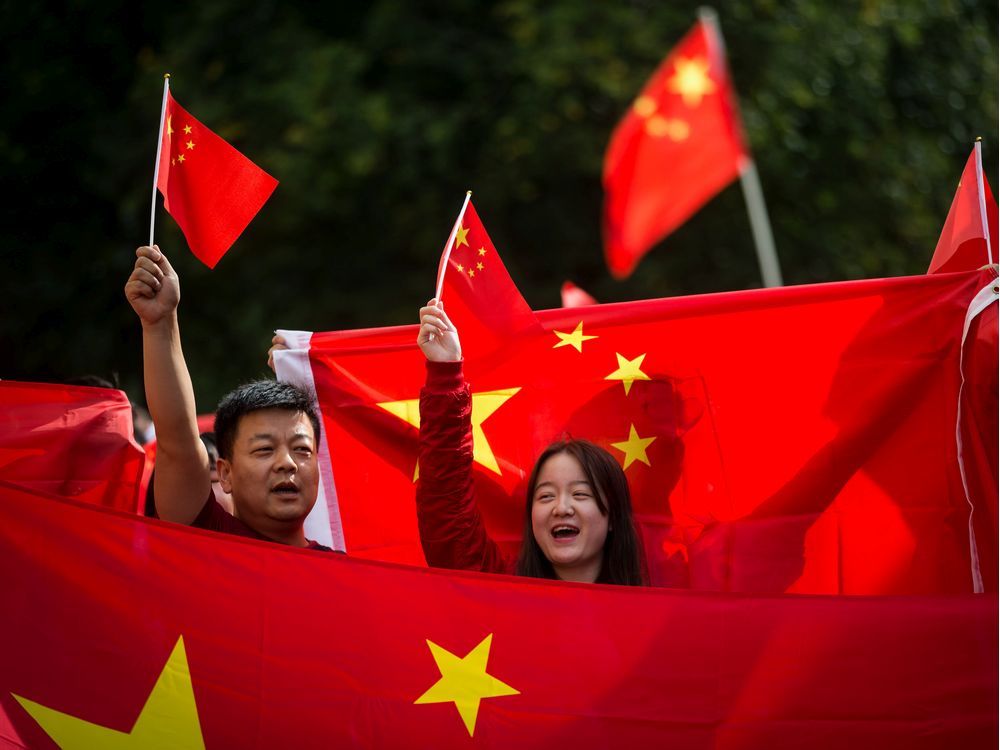'Overseas Chinese' urged to be more vocal in support of Beijing, says Chinese cultural historian

Credit to Author: Cheryl Chan| Date: Tue, 20 Aug 2019 23:27:20 +0000
Chinese government influence is at play in the counter-protest movement against Hong Kong pro-democracy supporters, including in Vancouver, according to some China experts, although the extent of their involvement is difficult, if not impossible, to quantify.
Vancouver saw duelling protests over the weekend as two events organized by pro-Hong Kong supporters at Broadway-City Hall SkyTrain Station and outside the Chinese consulate drew a vocal contingent of counter-protesters waving Chinese flags.
Pro-China supporters wave the Chinese flag outside Broadway-City Hall SkyTrain Station in Vancouver on Aug. 17, 2019.
“We know the consulate is encouraging the pro-government segment to be more vocal,” said Leo Shin, a Chinese cultural historian and professor at the University of B.C.
“It is very difficult to prove, but we know that the Chinese consulate has been cultivating ties among the various Chinese community organizations in Vancouver and elsewhere in Canada.”
These ties don’t come with blatant quid pro quos, but with subtle and unspoken requests of support for the Chinese regime, which is mindful of the importance of public opinion, explained Shin.
The Chinese Communist Party has been frank about calling on support from ethnic Chinese residents living in other countries, which Beijing considers “overseas Chinese.”
Last August the party’s Central Committee urged overseas Chinese to “remember the call from the Party and the people” and “spread China’s voice.”
Much of that “soft power” work overseas is carried out by the United Front Work Department, an offshoot of the Chinese Communist Party.
A 2017 Financial Times story outlines the nine bureaus of the United Front. The third bureau, for instance, works to promote relationships and loyalty within Hong Kong, Macau, Taiwan and overseas Chinese in other countries.
Their role is to build bridges and connections and incorporate various Chinese communities and organizations into a “sphere of friendship or influence,” said Shin.
Pro-Hong Kong supporters hold signs proclaiming solidarity with Hong Kong protesters outside Broadway-City Hall SkyTrain Station in Vancouver on Aug. 17, 2019.
The Chinese government may also be using newer techniques suited to the digital age.
On Monday, both Facebook and Twitter shut down accounts from China that amplified messages that depicted Hong Kong’s protesters as violent and extreme in a bid to discredit the protest movement. Twitter said it believes the misinformation campaign was a “co-ordinated state-backed operation.”
Speaking broadly and not specifically about the Vancouver protests, Christopher Rea, associate head of the department of Asian Studies at UBC, said China’s Communist government has a history of encouraging nationalistic protests and counter-protests, within China and in other countries.
The Chinese government is known to use “plants” and agitators and provide material support to events it considers supportive of its policies.
“Counter-protests against people advocating universal suffrage and political reform for Hong Kong are not, for the most part, the spontaneous actions of individuals,” said Rea.
“They represent the success of state propaganda even among some emigrants, who mistakenly believe that greater autonomy for Hong Kong will weaken Chinese sovereignty over the (special autonomous region).”
Counter-protesters wave Chinese flags outside the Chinese consulate on Granville Street in Vancouver on Aug. 18, 2017.
One attendee of the pro-China protest outside the consulate told Postmedia they are volunteers who don’t receive any resources from the Chinese consulate.
They show up at protests organized by Hong Kong supporters because they know media will cover the event and they want to make sure their voices are heard, said Ashley Yu, an international student from China who has been living in Vancouver for two years.
The Chinese consulate in Vancouver ignored questions on whether it was involved, directly or indirectly, in organizing counter-protests in Vancouver and whether it had provided any support to the groups.
Instead, it blamed “foreign forces” for the situation in Hong Kong and “western media” for “distorting the facts.”
“They even targeted (the) Chinese government and its diplomatic missions overseas by misleading implications and groundless accusation of their interfering in local politics,” said the consulate in an emailed statement.
On the protests outside the consulate on Sunday, the consulate said it was “understandable and reasonable for local overseas Chinese to express indignation and opposition against words and deeds that attempt to separate China and smear its image.”
The Hong Kong protests started over a controversial extradition bill but have grown to include calls for Hong Kong chief executive Carrie Lam to step down, an inquiry into police actions, and amnesty for those arrested. None of the demands made by Hong Kong protesters mentioned independence.
Efforts by the Chinese government to influence ethnic Chinese abroad is potentially dangerous, especially if it clashes with the host country’s values, said Josephine Chiu-Duke, a professor of Asian Studies at UBC.
Most Canadian citizens who identify with the country’s core liberal values and respect for human rights would not fall for these manoeuvres, she said. But newer immigrants who have deep-seated cultural ties with their homeland or culture may present a more difficult dilemma.
“On one hand, we need to acknowledge and respect their feelings toward their original home and culture,” said Chiu-Duke. “On the other hand, we also hope that those who choose to stay in Canada and become citizens would identify with and honour Canadians liberal values so that our democracy can be sustained.
It is important for Canadian society to guard its liberal values and strengthen civic education in order to make sure these values are passed on to the next generation, she stressed.